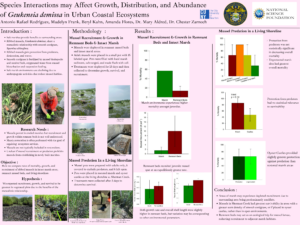
Antonio Rodriguez – Zarnoch Lab
ePortfolio Posts
Species Interactions Poster & Presentation
Private: Urban Beekeeping
Urban beekeeping is a modern phenomenon following industrialization. The privatization of all markets encourages individuals to intrinsically operate from an individualistic perspective. The societal benefits as discussed within the article, of fostering a sense of community and creating opportunities for education and growth are negated when there is an oversaturation of hives within a small area. As a greater population of people purchase and cultivate their own hives, they further isolate themselves from the surrounding community. This saturation can create increased competition for nutrients, exacerbate the spread of disease amongst individuals and across hives of overlapping territories. These issues are solely from anthropogenically influenced factors, and do not account for the ecosystem derived issues that may arise.
Most other bee species and pollinators are solitary, and therefore are far less productive and demanding on their native environments as opposed to the invasive European honey bee. These species may be experiencing significant decline in numbers or availability as they are pushing pushed from lack of resources. I agree with the authors of the article proposing the removal, restriction, or liquidization of many hives, into community based bee-keeping. A “Queen,” may be able to run this portion of the facility and work with apprentices who are passionate about conservation of bees and other pollinators, and wish to either educate youths or aid in sustainability practices. Followed or operating a portion of volunteers, youths, or other programs to promote a wide-sweeping community based effort. While the current effort may be mismanaged or overindulged, these issues do not exist within a vacuum, and can be ameliorated with combined efforts and cooperation from literate scientists and surrounding communities.
